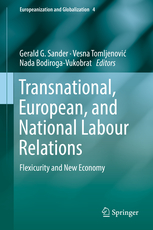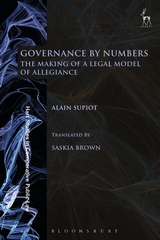
단행본Europeanization and globalization 4
Transnational, European, and national labour relations: flexicurity and new economy
- 청구기호
- 331.094 TRA2018
- 발행사항
- Cham : Springer, 2018
- 형태사항
- 327 p
- 서지주기
- Includes bibliographical references
- ISBN
- 9783319022185
- 분류기호
- 듀이십진분류법->331.094
소장정보
| 위치 | 등록번호 | 청구기호 / 출력 | 상태 | 반납예정일 |
|---|---|---|---|---|
이용 가능 (1) | ||||
| 한국노동연구원 | 00008861 | 대출가능 | - | |
이용 가능 (1)
- 등록번호
- 00008861
- 상태/반납예정일
- 대출가능
- -
- 위치/청구기호(출력)
- 한국노동연구원
책 소개
This book employs an innovative approach to explore the topic of flexicurity and related changes in the working world, the importance of which for the overall economic and social development is gradually being recognised. It focuses on the changing nature of work and its impact on EU law and national labour and social security laws. Though the transformation of regulatory and institutional frameworks of labour relations follows different patterns in different EU Member States, it is nevertheless a common phenomenon that offers an excellent opportunity for mutual learning experiences and comparing notes on best practices.
Taking these ideas as a starting point, the book presents a collection of research on various aspects and implications of changing labour relations in the EU Member States. The opening chapters address the internal market dimension of the transformation of employment relations by investigating how social dumping, integration of migrant workers, and cross-border mergers influence national labour policies and laws. The book further analyses linguistic and terminological challenges in the field of labour law in the EU’s multi-lingual legal environment. Subsequent chapters cover various theoretical and practical issues, such as the impact of chain-liability regulatory models on the legal situation of workers in subcontracting networks, and modern work arrangements in the collaborative or ‘gig’ economy. Other chapters are dedicated to issues of jurisdiction and law applicable to individual employment contracts, as well as alternative resolution mechanisms in labour disputes. The next section offers fresh insights on and a critical overview of the well-known Danish and Dutch models of flexicurity, often cited as role models for reforms of labour markets in other EU Member States. Three individual chapters investigate specific aspects of flexicurity in Croatia, in terms of individual dismissals, life-long learning and the impact of non-standard employment on future pension entitlements. One paper explores temporary agency work in Germany as an important instrument of flexicurity, while another discusses various forms of work used in Slovenia in the context of flexibilization of work relations. Many challenges still lie ahead, and the primary aim of this book is to provide a solid basis for informed future discussions.
목차
Transformation of Employment Relations and Social Dumping in the European Union: The Struggle Between David and Goliath?
Cross-Border Mobility, Supranational Companies and Employee Participation: No Chance for Harmonisation
Immigration and Labour Policies: Paradoxes of the European Union
Making a Living in the ‘Gig’ Economy: Last Resort or a Reliable Alternative?
Law Applicable to Employment Contracts Under the Rome I Regulation
Coping with Vague EU Legal Concepts
International Jurisdiction over Individual Contracts of Employment
Liability Models in Supply Chains: The Flow of an Innovative Regulatory Idea in a Global Legal Space
Functional Flexibility in the Context of Lifelong Learning
Danish Flexicurity: Not the Same Today as Yesterday
Dilemmas in Organising the Labour Market, Experiences with Flexicurity in the Netherlands
Temporary Agency Work in Germany: A Short History and the Situation de lege lata
Flexible and New Forms of Employment in Croatia and Their Pension Entitlement Aspects
Individual Dismissal in Croatia
ADR in Labour Law Disputes in Italy
Forms of Work Performed in the Republic of Slovenia

